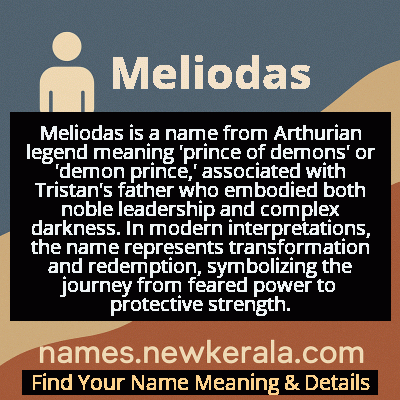Meliodas Name Meaning & Details
Origin, Popularity, Numerology Analysis & Name Meaning of Meliodas
Discover the origin, meaning, and cultural significance of the name MELIODAS. Delve into its historical roots and explore the lasting impact it has had on communities and traditions.
Name
Meliodas
Gender
Male
Origin
Arthurian
Lucky Number
6
Meaning of the Name - Meliodas
Meliodas is a name from Arthurian legend meaning 'prince of demons' or 'demon prince,' associated with Tristan's father who embodied both noble leadership and complex darkness. In modern interpretations, the name represents transformation and redemption, symbolizing the journey from feared power to protective strength.
Meliodas - Complete Numerology Analysis
Your Numerology Number
Based on Pythagorean Numerology System
Ruling Planet
Venus
Positive Nature
Harmonious, responsible, caring, and artistic.
Negative Traits
Overly idealistic, superficial, possessive, or jealous.
Lucky Colours
Pink, turquoise.
Lucky Days
Friday.
Lucky Stones
Diamond, turquoise.
Harmony Numbers
2, 3, 9.
Best Suited Professions
Artists, musicians, teachers, healthcare workers.
What People Like About You
Warmth, nurturing nature, artistic flair.
Famous People Named Meliodas
Meliodas of Lyonesse
Arthurian Knight
King of Lyonesse and father of Tristan in Arthurian legend
Meliodas (The Seven Deadly Sins)
Fictional Character
Protagonist and leader of the Seven Deadly Sins in the popular manga/anime series
Meliodas of Cornwall
Legendary Monarch
Ruler of Cornwall and father of Tristan in some Arthurian traditions
Name Variations & International Equivalents
Click on blue names to explore their detailed meanings. Gray names with will be available soon.
Cultural & Historical Significance
The name's cultural impact was dramatically revitalized in the 21st century through Nakaba Suzuki's manga series 'The Seven Deadly Sins' and its anime adaptation. This modern interpretation transformed Meliodas from an obscure Arthurian reference into a globally recognized character, introducing the name to millions worldwide. The contemporary version maintains the Arthurian connection through themes of knighthood and complex morality while adding new layers of supernatural power and eternal love. This dual heritage makes Meliodas a rare example of a name that bridges medieval European literature and modern Japanese pop culture, creating a rich cultural tapestry that continues to evolve.
Extended Personality Analysis
The name Meliodas suggests a personality marked by profound complexity and emotional depth. Individuals with this name are often perceived as natural leaders who carry their authority with a surprising lightness, capable of both fierce determination and playful humor. There's typically a protective quality to their character, with strong loyalties to family and close companions that can border on the obsessive. This protective instinct is balanced by an independent spirit and a willingness to challenge conventions when necessary.
Beneath the surface, those named Meliodas often harbor intense emotional currents and may have experienced significant personal trials that have shaped their character. They possess remarkable resilience and the ability to transform suffering into strength. The name implies someone who understands darkness but chooses light, making them particularly empathetic to others' struggles. Their complexity means they can be difficult to fully understand, often revealing different facets of their personality in different contexts. This creates an intriguing, sometimes mysterious presence that draws others to them while maintaining an essential core of integrity and purpose.
Modern Usage & Popularity
In contemporary usage, Meliodas has transitioned from an obscure Arthurian reference to a name with growing recognition, primarily due to the massive popularity of 'The Seven Deadly Sins' franchise. While still uncommon as a given name, it has found particular resonance within anime and fantasy enthusiast communities. The name appeals to parents seeking distinctive, mythologically-grounded names that carry strong character associations without being overly common. Its usage trends show gradual increase in countries with strong fantasy and anime cultures, though it remains a niche choice. The name's complexity and distinctive phonetic quality make it memorable, while its association with a beloved modern character gives it contemporary relevance that balances its medieval origins.
Symbolic & Spiritual Meanings
Symbolically, Meliodas represents the reconciliation of opposites - the fusion of demonic and divine, darkness and light, mortality and eternity. The name embodies the concept that true strength often emerges from vulnerability and that the most powerful individuals are those who have mastered their own shadows. It symbolizes eternal devotion and the idea that love can transcend even death and transformation. The character's journey from a feared demon prince to a protective leader represents the alchemical process of turning base metal into gold - the transformation of raw power into purposeful strength.
As a symbolic archetype, Meliodas represents the guardian who stands between order and chaos, capable of immense destruction but choosing protection and preservation. The name carries connotations of sacrifice and redemption, suggesting that nobility is not inherent but earned through choices and actions. It also symbolizes the idea that leadership emerges not from seeking power but from accepting responsibility for others. The eternal aspect of the modern character adds layers of symbolism related to timeless love and the persistence of identity across vast stretches of time and transformation.

